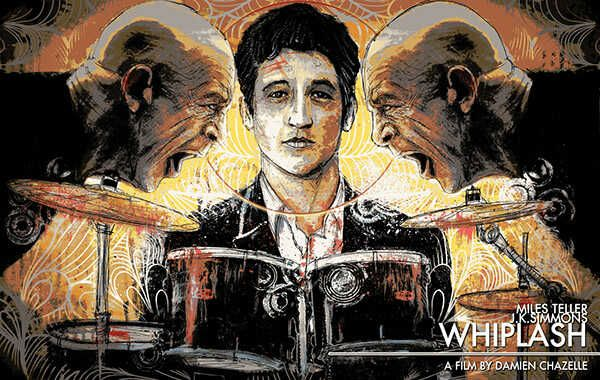Whiplash (2014), written and directed by Damien Chazelle, is a psychological drama that follows a passionate drummer, Andrew Neiman (Miles Teller). In the pursuit of musical prestige, Neiman attends Shaffer Conservatory, a music school in New York City. It’s here that Neiman meets the jazz band director, Terrence Fletcher (J.K. Simmons), an obsessive perfectionist who degrades his band into meeting his unreachably high standards. Throughout the film, Fletcher’s oppression transforms Neiman’s musical naivety to dark obsession. Through formal, deconstructive, psychoanalytic, and moral lenses, this essay seeks to explore the effects of Fletcher’s behavior on Neiman over the course of the film.

Themes of obsession are prominent in Whiplash, being depicted in a number of ways, the most recurrent of which is color. Color is used symbolically throughout the film to illustrate feelings and ideas in characters and settings – mainly, to portray Neiman’s progression as a character. In the film, the color black is tied to power, being worn by Fletcher; inversely, the color white is tied to purity, being worn by Neiman. However, as Fletcher influences Neiman’s behavior, Neiman’s shirt turns from white to black. This is indicative of Neiman’s growing obsession surrounding his craft and his adoption of Fletcher’s perfectionism and power. Furthermore, much of the film is drowned in a deep-saturated yellow, portraying a combination of passion and evil, further reflecting Neiman’s descent into obsession.
Leading off of this, Whiplash incorporates strong psychoanalytic and moral elements into its characters and story, most prominent in Fletcher and Neiman. Throughout, Fletcher is portrayed as a master manipulator, twisting Neiman in the perfect ways to elicit anger, desire, sadness, or whatever else is needed to further his purpose. This shows that Fletcher will abandon morals to reach his goals, indicating an absent superego. Contrarily, Neiman is an innocent character at the outset. He’s driven by his pursuit of musical prestige, and, knowing Fletcher’s reputation as a brilliant band director, leaps at the opportunity to join his band when extended. However, Fletcher’s abuse ultimately transforms Neiman into a reflection of himself, morphing his naïve passion into unrelenting obsession. This plays strongly into psychoanalytic themes as Neiman’s motivation and purpose is overthrown to meet Fletcher’s needs.

Whiplash is a powerful example of how unhealthy obsession can shape one’s behavior and
perception. Through formal, deconstructive, psychoanalytic, and moral lenses, this film
illustrates the deep internal effects of Fletcher’s abuse on Neiman and shows his progression and
diminishment as a character.







